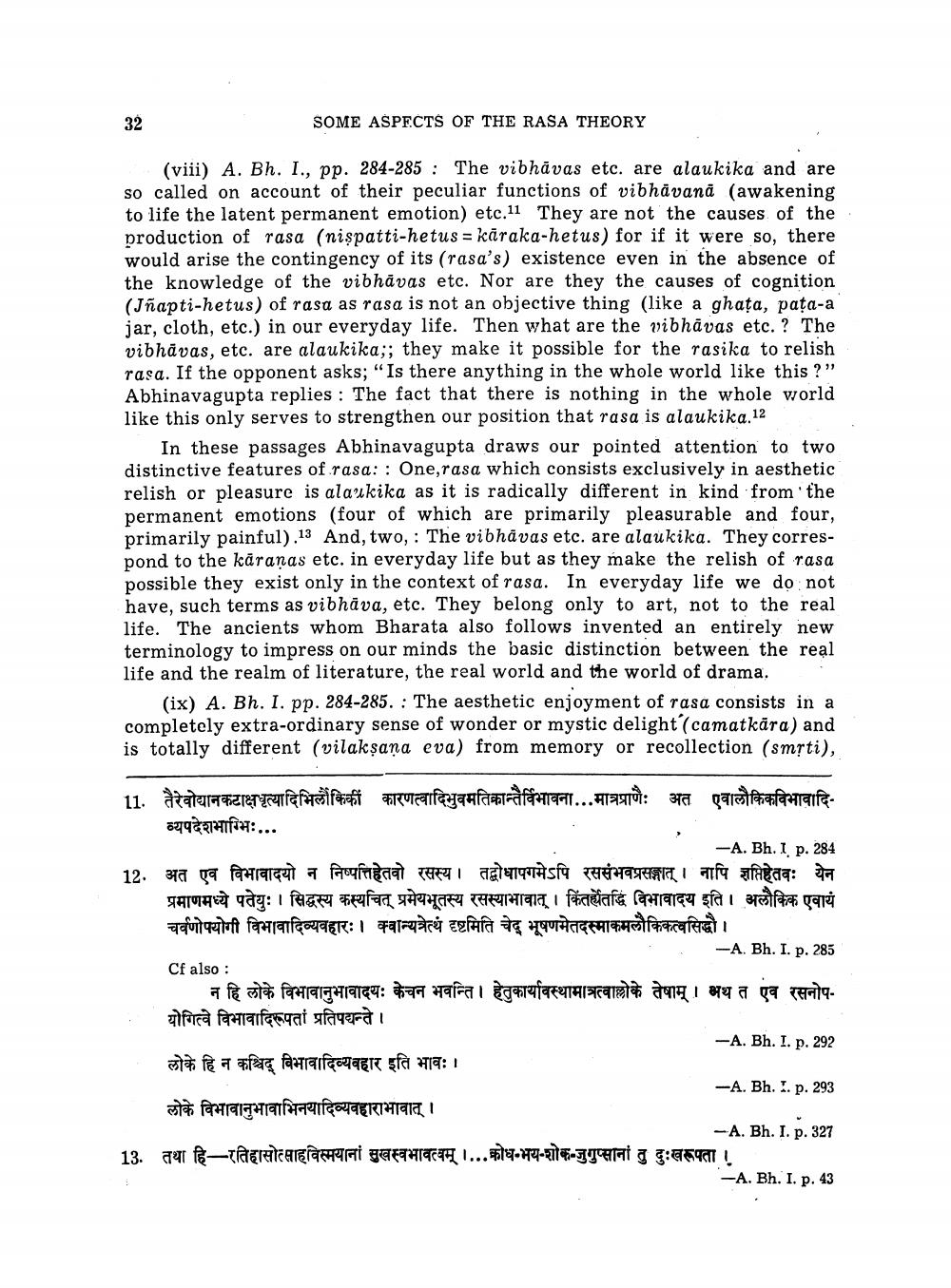________________
SOME ASPECTS OF THE RASA THEORY
(viii) A. Bh. I., pp. 284-285 : The vibhāvas etc. are alaukika and are so called on account of their peculiar functions of vibhāvanā (awakening to life the latent permanent emotion) etc.11 They are not the causes of the production of rasa (nispatti-hetus = kāraka-hetus) for if it were so, there would arise the contingency of its (rasa's) existence even in the absence of the knowledge of the vibhāvas etc. Nor are they the causes of cognition (Jhapti-hetus) of rasa as rasa is not an objective thing (like a ghata, pata-a jar, cloth, etc.) in our everyday life. Then what are the vibhāvas etc.? The vibhāvas, etc. are alaukika;; they make it possible for the rasika to relish rasa. If the opponent asks; "Is there anything in the whole world like this?" Abhinavagupta replies: The fact that there is nothing in the whole world like this only serves to strengthen our position that rasa is alaukika.12
In these passages Abhinavagupta draws our pointed attention to two distinctive features of rasa: : One,rasa which consists exclusively in aesthetic relish or pleasure is alaukika as it is radically different in kind from the permanent emotions (four of which are primarily pleasurable and four, primarily painful).13 And, two,: The vibhāvas etc. are alaukika. They correspond to the karanas etc. in everyday life but as they make the relish of rasa possible they exist only in the context of rasa. In everyday life we do not have, such terms as vibhāva, etc. They belong only to art, not to the real life. The ancients whom Bharata also follows invented an entirely new terminology to impress on our minds the basic distinction between the real life and the realm of literature, the real world and the world of drama.
(ix) A. Bh. I. pp. 284-285. : The aesthetic enjoyment of rasa consists in a completely extra-ordinary sense of wonder or mystic delight (camatkāra) and is totally different (vilaksana eva) from memory or recollection (smrti),
11. तैरेवोद्यानकटाक्षधृत्यादिभिलौकिकीं कारणत्वादिभुवमतिक्रान्तैर्विभावना...मात्रप्राणैः अत एवालौकिकविभावादिव्यपदेशभाग्भिः ...
-A. Bh. I p. 284 12. अत एव विभावादयो न निष्पत्तिहेतवो रसस्य। तद्वोधापगमेऽपि रससंभवप्रसङ्गात् । नापि ज्ञप्तिहेतवः येन
प्रमाणमध्ये पतेयुः । सिद्धस्य कस्यचित् प्रमेयभूतस्य रसस्याभावात् । किंतर्खेतद्धिं विभावादय इति । अलौकिक एवायं चर्वणोपयोगी विभावादिव्यवहारः। क्वान्योत्थं दृष्टमिति चेदु भूषणमेतदस्माकमलौकिकत्वसिद्धौ।
. -A. Bh. I. p. 285 Cf also :
न हि लोके विभावानुभावादयः केचन भवन्ति । हेतुकार्यावस्थामात्रत्वालोके तेषाम् । अथ त एव रसनोपयोगित्वे विभावादिरूपतां प्रतिपद्यन्ते ।
-A. Bh. I. p. 292 लोके हि न कश्चिद् विभावादिव्यवहार इति भावः ।
-A. Bh. .. p. 293 लोके विभावानुभावाभिनयादिव्यवहाराभावात् ।
-A. Bh. I. p. 327 13. तथा हि-रतिहासोत्साहविस्मयानां सुखस्वभावत्वम् ।...क्रोध-भय-शोक-जुगुप्सानां तु दुःखरूपता।
-A. Bh. I. p. 43




